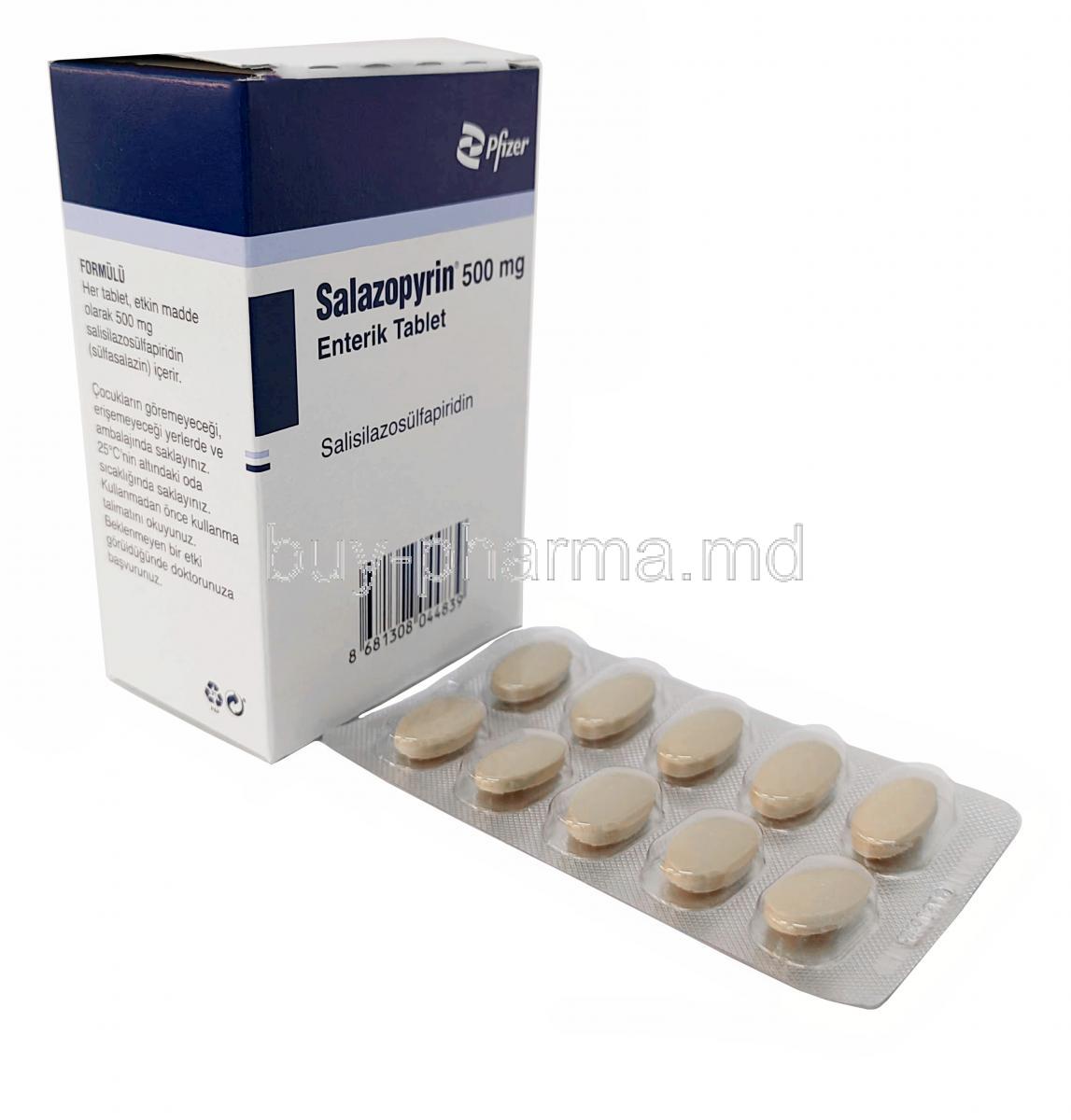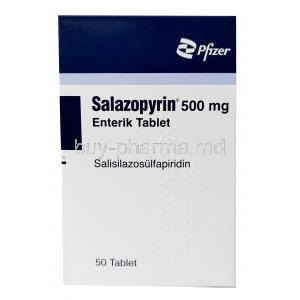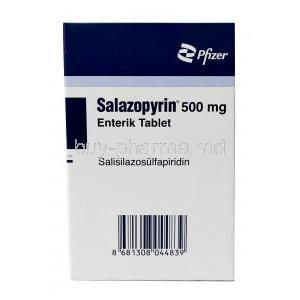What is Salazopyrin?
Salazopyrin, also known as sulfasalazine, is a medication that belongs to a class of drugs called aminosalicylates. It is commonly used to treat various inflammatory bowel diseases (IBD) and some rheumatic conditions. The drug works by reducing inflammation and swelling in the affected areas.
Salazopyrin is primarily used for the following conditions:
- Ulcerative colitis: This is an inflammatory bowel disease that causes long-lasting inflammation and ulcers in the digestive tract. Salazopyrin helps reduce the inflammation and alleviate symptoms such as diarrhea, abdominal pain, and rectal bleeding.
- Crohn's disease: This is another type of IBD that causes inflammation of the lining of the digestive tract. Salazopyrin may be used to manage the symptoms of Crohn's disease, although it is not as commonly prescribed for this condition as it is for ulcerative colitis.
- Rheumatoid arthritis: Salazopyrin is sometimes used to treat rheumatoid arthritis, an autoimmune disorder that causes inflammation in the joints, leading to pain, swelling, and stiffness. The drug helps to reduce joint inflammation and improve overall joint function.
- Ankylosing spondylitis: This is a type of arthritis that affects the spine, causing inflammation, pain, and stiffness. Salazopyrin may be prescribed to help manage the symptoms of ankylosing spondylitis.
Before using Salazopyrin, consult your healthcare professional to ensure that it is suitable for your specific condition and needs. It is crucial to follow the prescribed dosage and instructions provided by your healthcare professional, as improper use may lead to side effects or reduced effectiveness.
What is Salazopyrin use for?
Salazopyrin, or sulfasalazine, is a medication used to treat various inflammatory conditions, primarily inflammatory bowel diseases (IBD) and some rheumatic conditions. It works by reducing inflammation and swelling in the affected areas. Salazopyrin is primarily used for the following conditions:
-
Ulcerative colitis: Salazopyrin is commonly used to treat ulcerative colitis, an inflammatory bowel disease that causes long-lasting inflammation and ulcers in the digestive tract. It helps to reduce inflammation, alleviate symptoms such as diarrhea, abdominal pain, and rectal bleeding, and maintain remission.
-
Crohn's disease: Although not as commonly prescribed for Crohn's disease as for ulcerative colitis, Salazopyrin may still be used to manage symptoms of this IBD, which causes inflammation of the lining of the digestive tract.
-
Rheumatoid arthritis: Salazopyrin can be used to treat rheumatoid arthritis, an autoimmune disorder that causes inflammation in the joints, leading to pain, swelling, and stiffness. It helps to reduce joint inflammation and improve overall joint function.
-
Ankylosing spondylitis: Salazopyrin may be prescribed to help manage the symptoms of ankylosing spondylitis, a type of arthritis that affects the spine, causing inflammation, pain, and stiffness.
Before using Salazopyrin, it is essential to consult with your healthcare professional to ensure that it is appropriate for your specific condition and needs. Always follow the prescribed dosage and instructions provided by your healthcare professional to ensure the safe and effective use of the medication.
How to use Salazopyrin?
Salazopyrin (sulfasalazine) is typically taken orally in the form of tablets. It is important to follow your healthcare professional's instructions and the prescription label to ensure the safe and effective use of the medication. Here are some general guidelines for using Salazopyrin:
-
Dosage: Your healthcare professional will determine the appropriate dosage based on your medical condition, age, and response to treatment. The dosage may be adjusted over time to achieve the best results.
-
Take with food: To minimize gastrointestinal side effects, it is generally recommended to take Salazopyrin with a meal or a glass of water.
-
Follow the schedule: Take Salazopyrin at evenly spaced intervals throughout the day to maintain a consistent level of the drug in your body. Try to take the medication at the same time each day.
-
Do not crush or chew: Swallow the tablets whole, without crushing or chewing them, to ensure proper release of the medication in the gastrointestinal tract.
-
Complete the course: Continue taking Salazopyrin for the full duration prescribed by your healthcare professional, even if your symptoms improve. Stopping the medication too soon may cause a relapse or worsen your condition.
-
Monitor your progress: Regularly consult your healthcare professional to evaluate your response to the treatment and make any necessary adjustments.
-
Stay hydrated: Drink plenty of water while taking Salazopyrin, as it can cause crystals to form in the urine, leading to kidney stones or other kidney-related issues.
Remember that individual response to Salazopyrin may vary, and it is crucial to follow your healthcare professional's recommendations to achieve the best results. If you experience any side effects or have concerns about the medication, contact your healthcare professional for guidance.
What are the side effects of Salazopyrin?
Salazopyrin (sulfasalazine) can cause side effects, although not everyone will experience them. Some common side effects include:
-
Gastrointestinal issues: Nausea, vomiting, stomach pain, loss of appetite, and diarrhea are common side effects, especially when starting the medication. Taking Salazopyrin with food or water can help minimize these side effects.
-
Headache: Some people may experience headaches while taking Salazopyrin.
-
Dizziness or lightheadedness: These symptoms may occur, especially when standing up too quickly.
-
Rash or itching: Skin reactions such as rashes, itching, or hives may occur in some individuals.
-
Changes in urine color: Salazopyrin may cause an orange-yellow discoloration of the urine, which is generally harmless.
-
Sensitivity to sunlight: The medication may make your skin more sensitive to sunlight, increasing the risk of sunburn. Use sunscreen and wear protective clothing when outdoors.
In rare cases, Salazopyrin can cause more severe side effects:
-
Liver problems: Symptoms include yellowing of the skin or eyes (jaundice), dark urine, severe stomach pain, or persistent nausea or vomiting.
-
Kidney issues: Symptoms include changes in the amount of urine, painful or difficult urination, or pink or bloody urine.
-
Blood disorders: Symptoms include unexplained bruising or bleeding, persistent sore throat or fever, or extreme fatigue.
-
Severe skin reactions: These may include blistering, peeling, or severe rashes, which require immediate medical attention.
-
Allergic reactions: Signs of a serious allergic reaction include difficulty breathing, swelling of the face, lips, tongue, or throat, and severe dizziness.
If you experience any concerning side effects, discontinue the medication and contact your healthcare professional immediately. Always follow your healthcare professional's recommendations and the prescription label to minimize the risk of side effects.
How effective is Salazopyrin?

























